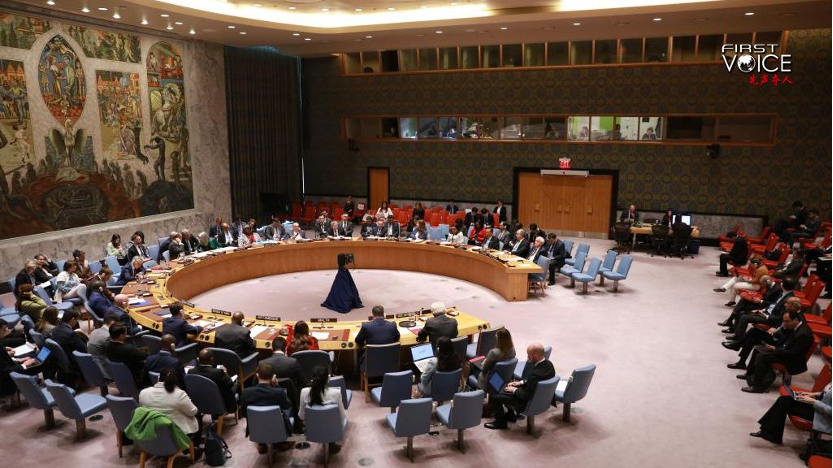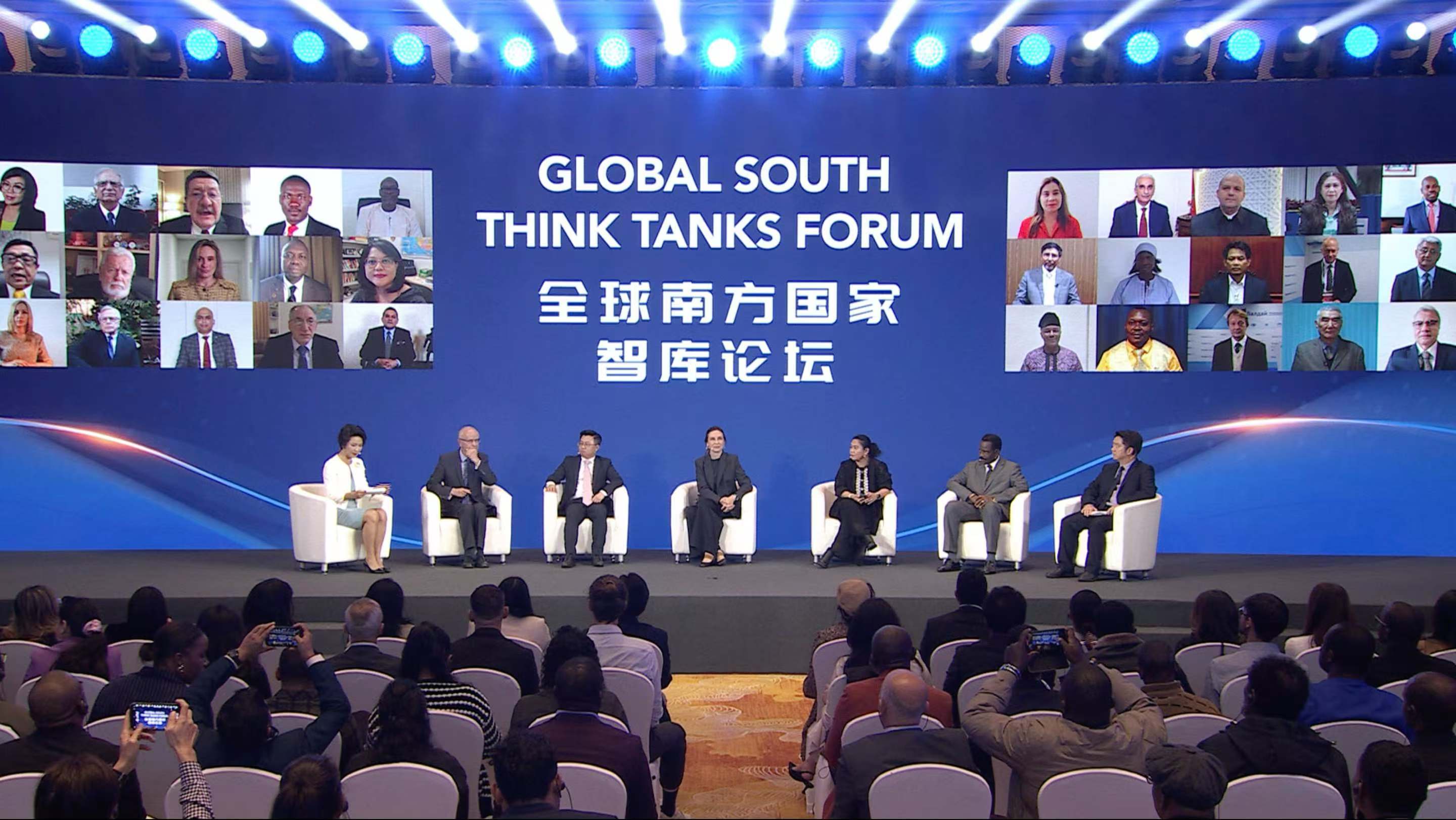
Editor's note: CGTN's First Voice provides instant commentary on breaking stories. The column clarifies emerging issues and better defines the news agenda, offering a Chinese perspective on the latest global events.
By Wei Nanzhi
2024 has been a turbulent year. The world seemed caught in a perpetual storm of crises, with geopolitical tensions mounting, economic challenges deepening and conflicts persisting across regions. From the unresolved conflict in Ukraine and the spiraling tensions in the Middle East to economic instability in parts of Africa and Latin America, the globe was a mosaic of volatility.
According to a 2024 public opinion survey done in 20 countries by the Global Times Institute, a Beijing-based think tank, economic crisis and international war are people's top concerns, and peace is the universal hope in this chaos. Among the global actors, China emerged as a pillar of stability, contributing significant balance to a troubled world. As Chinese President Xi Jinping said in his 2025 New Year address, China, as a responsible major country, is actively promoting global governance reform and deepening solidarity and cooperation among the Global South.
In most cases, poor economic conditions turned out to be a catalyst for the outbreak and perpetuation of violence. China's vision for global peace is that true peace can emerge only in an environment where economic development flourishes. This philosophy has manifested itself through measures such as the Belt and Road Initiative (BRI) and the expansion of the BRICS group.
The BRI has been transformative. In Peru, roughly 80 kilometers from its capital Lima, the Chancay Port was inaugurated during Xi's visit to the country this year. It's the first smart and green port in South America that, when its first phase is completed, will reduce the shipping time from Peru to China to 23 days and cut logistics costs by at least 20 percent. Goods from across Latin America will be efficiently transported to the port and to Asia through the combination of the port and the Pan-American Highway.
The China-Europe Railway Express, a flagship project under the BRI, surpassed 100,000 cumulative trips in 2024, bolstering trade connectivity across continents. The Qianhai Port in south China has become a landmark of the New International Land-Sea Trade Corridor, the transport corridor between western China and Southeast Asia, enhancing regional cooperation. With 155 countries and regions now participating in the BRI framework, this "road to prosperity" has benefited millions, enhancing infrastructure, trade, and people-to-people exchanges globally.
Moreover, China has played a leading role in empowering the Global South. At the 2024 Summit of the Forum on China-Africa Cooperation, Xi called on China and Africa to deepen cooperation and "promote modernization of the Global South with China-Africa modernization." China has remained Africa's largest trading partner for 15th consecutive year. And by the end of June, 2024, China has granted zero tariffs on 98 percent of tariff items from 27 least-developed African countries. The 2024 United Nation Trade and Development report highlights China's preferential trade measures, which have bolstered exports from least developed countries by over 12 percent annually.

Global South Think Tanks Forum takes place in Beijing, China, October 16, 2024. [Photo/CGTN]
China also worked to restore world peace and safeguard human lives. It mediated and fostered dialogue in the Ukraine crisis. Together with other Global South countries, it initiated the "Friends of Peace" group to build consensus on peace initiatives. In the face of the escalating violence in Gaza, China called for an immediate ceasefire, prioritized humanitarian aid, and upheld the "two-state solution" as the ultimate resolution.
It also helped the UN Security Council adopt its first Gaza ceasefire resolution, facilitated Palestinian factions' reconciliation with a "Beijing Declaration," and provided multiple rounds of humanitarian assistance to Gaza. Jeffrey Sachs, the Director of the Center for Sustainable Development at Columbia University, said that China is "increasingly able to broker peace" and stressed the importance of China as a global mediator.
China's endeavors to address the root causes of instability and prevent escalation have been widely recognized. According to a poll in March 2024 by CGTN and Renmin University of China, over 83 percent of the international respondents appreciated China's independent foreign policy of peace and said it would promote a more just and reasonable international order.
Yet as 2025 approaches, it is clear that challenges remain. Geopolitical conflicts persist, with many showing signs of escalation. The Russia-Ukraine conflict continues to destabilize Europe, aggravating energy shortages and food insecurity worldwide. The intensification of violence in the Israel-Palestine conflict and broader regional tensions have further complicated the prospects for peace in the Middle East. Addressing these issues requires sustained diplomatic engagement, innovative solutions, and a collective effort to alleviate humanitarian crises and rebuild trust.
Another pressing challenge lies in the volatile trajectory of China-U.S. relations. While 2024 saw high-level dialogues yielding some stabilization in areas like climate change and public health, divisions remain over strategic issues such as Taiwan, trade policies, and technological competition. The uncertainty surrounding U.S. domestic politics adds another layer of complexity, underscoring the need for a steady and pragmatic approach to managing bilateral relations.
China's resolve to maintain stability, however, is unwavering. As China's Foreign Minister Wang Yi has emphasized, finding the right way for the two great nations to coexist peacefully is essential for the well-being of both peoples and the stability of the world. By maintaining dialogue, managing differences, and fostering mutual trust with the U.S., China aims to build a model of constructive engagement between major powers.
Looking ahead, 2025 holds significant promise as well as challenges. It marks the 80th anniversary of both the end of World War II and the founding of the United Nations - poignant reminders of the enduring importance of international solidarity and multilateral cooperation. As the world faces pressing issues such as climate change, technological advancements, and economic recovery, China's role in shaping global governance will be more critical than ever.
China has contributed greatly to the maintenance of world peace and stability. China's diplomatic efforts are expected to remain steadfast, guided by its vision of building a community with a shared future for mankind. This includes fostering international partnerships, promoting sustainable development, and advocating for peace and justice in multilateral forums. By leveraging its economic strength and commitment to fair global governance, China will continue to give stability to an uncertain world, providing hope for a brighter, more harmonious future for all humanity.
Wei Nanzhi, a researcher at the Chinese Academy of Social Sciences, also contributed to this article.

 中文
中文



